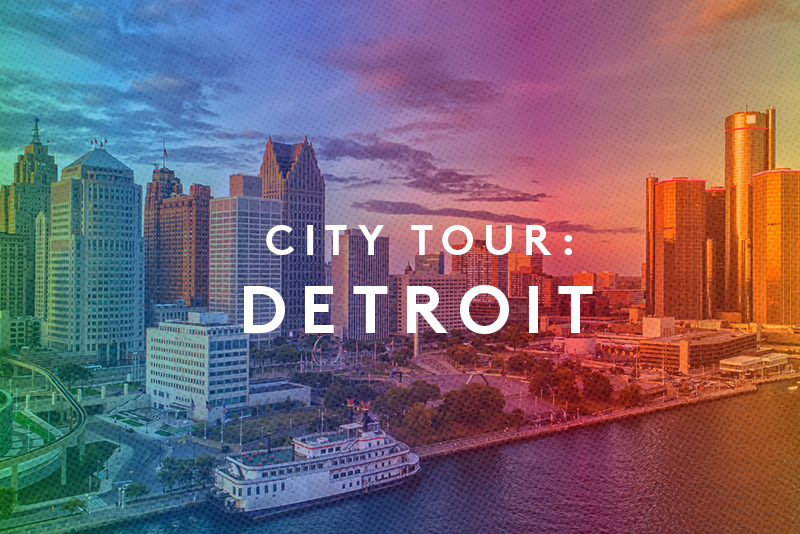
The LIFT Labs City Tour is a multi-city event featuring discussions with more than 200 founders, funders, and startup leaders.
Check out the City Tour experience for highlights and top insights from all seven cities.
Detroit’s startup ecosystem is filled with bright minds and scalable businesses eager to collaborate and innovate. The community, and the city, have come a long way since the crippling recession of 2008 — and the future is bright.
“We know the history. We know the future. We know the promise. We know about the resilience, grit, and talent — but we can’t make the assumption that the world does,” said Paul Riser, Managing Director of Tech-Based Entrepreneurship at TechTown Detroit.
The startup community is happy to embrace a Detroit vs. Everybody mantra. It was loud and clear at the LIFT Labs City Tour, a virtual discussion with founders, funders, and ecosystem builders in Detroit. Riser and others described an energized environment that’s ready for significant challenges.
» Here are some takeaways from our conversation:
Detroit’s Startup Ecosystem
Resilience. Detroit has seen its share of tough times. In the late 2000s, the recession led to layoffs and plummeting property values. Startups responded by renting affordable office space and working together to build great companies. The result is a robust startup economy that flourishes in the present day.
Detroit’s signature resilience has been on display during the pandemic. When startups needed immediate help and support, they got it. For example, Invest Detroit launched an emergency fund in the early days of the pandemic to help startups in need.
“We did what we normally do in a full calendar year in 12 weeks. We essentially doubled our portfolio trying to make sure our most vulnerable startups were able to get through the past year,” said Tember Shea, Venture Portfolio Manager at Invest Detroit.
A startup ecosystem that carved its own path. In the mid-2000s, Detroit’s startup ecosystem was nascent and predictably went through growing pains.
“We tried to copy and paste that Silicon Valley model in Detroit, but those initial efforts didn’t work,” said Monica Wheat, co-founder of Venture Catalysts, a large-scale ecosystem development group.
Soon a second wave came, with an influx of energy, collaboration, and talented entrepreneurs building large-scale projects, said Wheat. Companies are disrupting fintech, life sciences, mobility, SaaS, automotive tech, and the future of work. The ecosystem found its footing.
The pandemic, Wheat said, represents the third wave, as entrepreneurs showcase Detroit’s signature grit and determination.
“In Detroit, we have always been required to do a whole lot with a whole little,” said Wheat. “I think the pandemic is an exacerbation of that. I was proud to see so many of our leaders and partners rally for our founders. That attitude and energy were inspiring.”
An infectious sense of community. Many entrepreneurs and ecosystem builders characterize Detroit as a collaborative community.
“The willingness of people to help out actually inspires me to want to help out,” said Anthony Montalbano, co-founder of Backboard. “The giving environment is so powerful. Every time someone helps me, I have the same urge.”
In turn, the city’s biggest movers and shakers are typically available for meetings, coffee, and other networking opportunities, said Riser.
“There are minimal layers of separation between you and the people you want to access,” he said. “It is often easy to get connected with the right person.”
Tech talent. Attracting great tech talent outside of traditional hubs like Silicon Valley or New York is often a challenge. But with an abundance of colleges nearby and a growing tech ecosystem, Detroit has all the elements of success in place.
“It’s really underplayed, in my opinion. The tech talent here is robust,” said Wheat.
What Detroit Needs
Early-stage funding. One of the most significant gaps in the Detroit ecosystem is access to early-stage funding. Moody Mattan, CEO of BrandXR, said founders from Rust Belt cities are forced to jump through extra hoops to get funding.
“Here in Michigan, the bar is set a little higher for startups,” said Mattan. “For example, a startup in Silicon Valley could raise a $1 million pre-seed round with half the metrics of a company in Michigan. A lot of the requirements for pre-seed and seed capital are at a series A level. That is something that might be good to de-risk on the investor side — but for startups and to spur innovation, that hurts companies when they are just starting.”
Wheat added that more funding could really propel the community forward.
“The lack of access to funding is something we’re actively working on because that connects all the dots of all the other resources we have here,” said Wheat.
Connection to corporations. Another gap in the ecosystem is the lack of corporations willing to work with startups for pilot programs and other deals.
“It is tough for a startup to navigate. We know the corporations are looking for innovation and want to invest in it and talk with startups — but it’s hard to talk to the right people and get a deal signed,” said Mattan.
It’s quite a juxtaposition with Silicon Valley, where Detroit automotive stalwarts have opened satellite innovation offices hoping to find great ideas and tap into the region’s abundance of tech talent. Yet there are promising startups and technologists in their own backyards, said David Yanez CEO and founder of Andonix.
“Why do I have to go meet them there?” said Yanez. “We’re right here in Detroit.”
Did we miss anything? We know it’s impossible to learn everything about a particular startup community from just one event. If you’d like to add any attributes or challenges — or tell us about startups doing incredible things, drop us a line. We’d love to hear from you.

